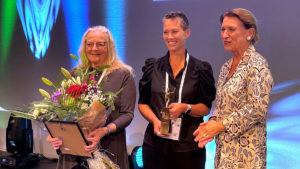Winner announced for the IFLA/Systematic Public Library of the Year Award 2022
27 July 2022

The “Public Library of the Year” award is presented by IFLA (International Federation of Library Associations and Institutions) with the aim of honouring new public libraries. Systematic is the proud main sponsor of the award.
The award, open to public libraries across the world, is presented to the library that has best managed to combine open and functional architecture with creative IT solutions and has included both digital developments and local culture. To be eligible for the award, the library must either be newly built or located in buildings that have previously been used for non-library purposes.
The award ceremony took place at the IFLA’s annual meeting and Missoula Public Library, USA was declared the winner, receiving $5,000. You can find out more about the award ceremony, as well as details of the winning library via the Systematic press release or IFLA’s news post from WLIC 2022.
The full awards’ session, with presentations from all the shortlisted libraries, is available via IFLA’s You Tube channel.
Assessment criteria
The following criteria were considered by the international jury:
1. Interaction with the surroundings and local culture: Including how the architecture reflects – or gives consideration to – the local culture of the community, how it provides visibility in the urban landscape and interaction with surrounding buildings and open spaces. Does the library serve as a driver of connections or movements in the urban context? Can the library function as a “living room” for the community, with access for all?
2. Architectural quality: Including how each space works in terms of functions and logistics. How is the architectural concept implemented and designed on different scales within the building? This is of great importance for how individual spaces within the library affect the people using them.
3. Flexibility: Including how rooms are designed and organised, and how surfaces and the combination of spaces are an inspiration for the users’ own activities and support new activities and synergy across various spaces. For example, does the library include makerspace facilities for workshops or a stage? Are these used, and if so, how? Can these spaces be easily modified and used for various functions and activities?
4. Sustainability: Including how sustainable thinking has been incorporated into the library, such as by reducing the quantities of resources used, using local materials in the construction process or by finding new ways to use natural resources as an energy source.
5. Learning space: Including the way the library offers a diversity of inroads to education, how learning spaces support different learning situations, appeal to different needs, age groups and encourage various learning formats – especially learning as a social phenomenon. How do the learning spaces interact with the rest of the library?
6. Digitisation: Including how digital communication and the accessibility of the library content are integrated within the library space, using methods that include mobile technologies. How are design, aesthetics and interaction used as the basis for this digitisation? Has digitisation been used in any innovative and creative ways to create experiences for the library users within the building?
Entrants are also encouraged to think about how their library reflects the UN Sustainable Development Goals and IFLA’s Global Vision.
See also our Frequently Asked Questions.
Previous Award winners
- 2021: Deichman Bjørvika, Norway
- 2019: Oodi Helsinki Central Library, Finland
- 2018: KopGroep Bibliotheken (School 7), Netherlands
- 2016: Dokk1, Denmark
- 2015: Kista Public Library, Sweden
- 2014: Craigieburn Library, Australia
Jury
The jury consists of the following members:
Chairman: Jakob Guillois Lærkes, Library Director, Gladsaxe Municipal Libraries, Denmark.
Members of the Public Library Section (IFLA):
- Sander van Kempen, Senior Adviser, KB, National Library of the Netherlands, Netherlands.
- Raneetha Rajaratnam, Deputy Director of the National Library of Singapore, Singapore.
Members of the Metropolitan Libraries Section (IFLA):
- Mathilde Servant, Project manager for innovative services – Library network of Paris, France.
- Flippie van der Walt, District Library Manager for the City of Cape Town, South Africa.
Members of the Buildings and Equipment (IFLA):
- Marian Morgan Bindon, Manager Library Service, City of Parramatta Libraries, Australia.
- Santi Romero Garuz, Architect. Head of Library Architecture Unit, Library Services Management Office, Diputació de Barcelona, Spain.